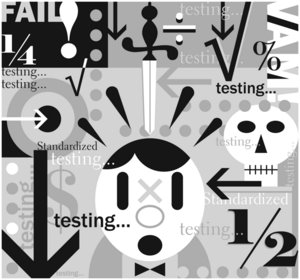by Kris Collett
President Obama and Secretary of Education Arne Duncan have another “reformy” idea. Surprised? No, me neither.

Now, in addition to using high-stakes standardized test scores to evaluate teachers and push merit pay schemes, they have a released a plan which will in part, use test scores to judge teacher preparation programs.
I guess it doesn’t matter to the administration that research has documented some serious problems with using high-stakes test scores to evaluate teachers.
Once again, politics trumps research.
Rethinking Schools editor Wayne Au summarized many of the problems with using tests and the buzz-y “value-added measurement (VAM)” in “Neither Fair Nor Accurate: Research-Based Reasons Why High-Stakes Tests Should Not Be Used to Evaluate Teachers,” from our Winter 2010 magazine issue.
Statistical error rates and year-to-year, as well as day-to-day test score instability top the list.
For example, he writes “there is a statistical error rate of 35 percent when using one year’s worth of test data to measure a teacher’s effectiveness, and an error rate of 25 percent when using data from three years.”
That means “there is a one-in-four chance that a teacher rated as ‘average’ could be incorrectly rated as ‘below average’ and face disciplinary measures. Because of these error rates, a teacher’s performance evaluation may pivot on what amounts to a statistical roll of the dice.”
And given that monetary incentives and rewards are built into the administration’s plan for evaluating teacher education programs, there’s a lot at stake. The administration is literally gambling when they use high-stakes standardized test scores in their evaluation.
Wayne writes in his article,
“The shakiness of test-based VAM data illustrates that the current fight over teacher ‘accountability’ isn’t really about effectiveness. The more substantial public conversation we should be having about rising poverty, the racial resegregation of our schools, increasing unemployment, lack of health care, and the steady defunding of the public sector—all factors that have an overwhelming impact on students’ educational achievement—has been buried. Instead, teachers and their unions [and now teacher preparation programs] have become convenient scapegoats for our social, educational, and economic woes.”
Don’t get us wrong. We ought to examine how these programs are preparing today’s teachers, and help them improve. We’ll be the first in line to suggest a stronger emphasis on using anti-racist, multicultural curriculum, more deeply understanding students’ lives, and building community in the classroom.
But evaluating teachers and their preparation programs must be done in a “fair and accurate way,” writes Wayne. “Using high stakes standardized tests and VAM “to make such evaluations is neither.”
Read Wayne’s entire article here.
And watch for a new book from Rethinking Schools next Spring, Pencils Down: Rethinking High-Stakes Testing and Accountability in Public Education. Editors Wayne Au and Melissa Bollow Tempel are working hard on the project now!
This post represents the views of the author, and not necessarily those of Rethinking Schools.
